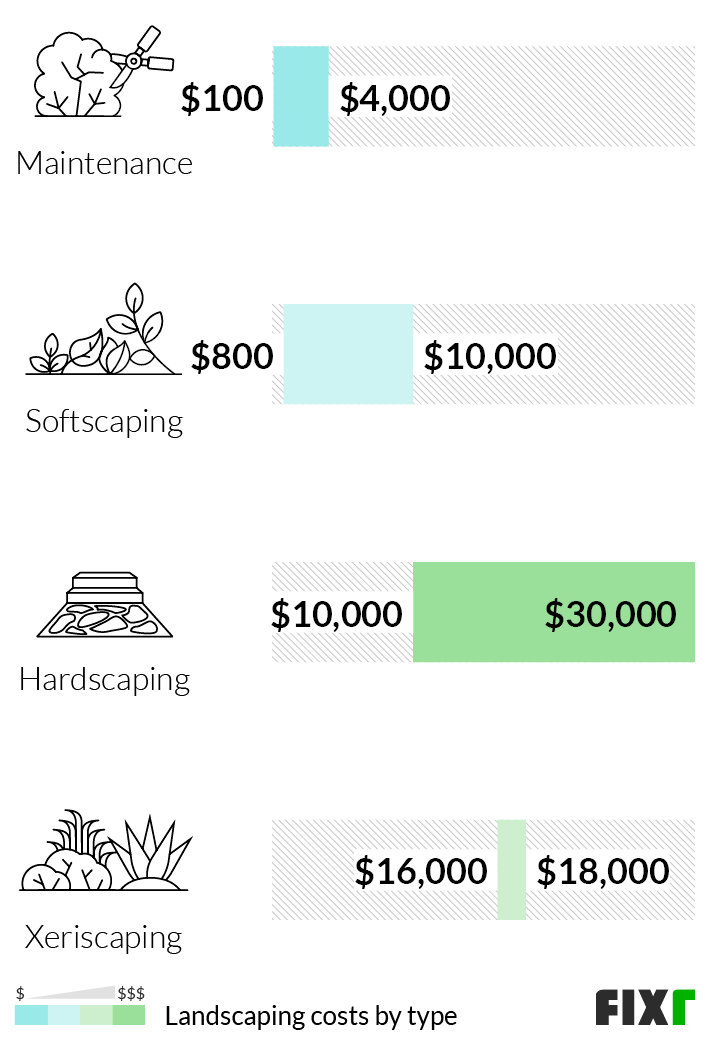The landscaping industry is growing fast. It’s expected to grow at a rate of 7.3% between now and 2030, according to Grand View Research. With more businesses and households investing in outdoor spaces, demand is rising for professional landscaping services.

Projected market growth creates exciting opportunities for aspiring entrepreneurs. With the right planning and equity, your local landscaping venture can blossom into a thriving operation. This is a good time to get involved in the landscaping business market.
In this guide, we’ll talk about how to start a landscaping business. Topics include marketing, customer focus, registering an EIN, accounting tips, and competitive analysis. Here’s everything you need to know about running your own landscaping business.
1. Conduct Pressure Washing Market Research
Market research is an essential tool for anyone in landscaping services. It provides important data for your landscaping business plan.
Primary market research uses data you collect yourself through customer polls and visiting competitor websites. Secondary research involves third-party data from government websites and marketing statistics.

There are many areas to pinpoint in your lawn care business research, including:
Popular Landscaping Business Structures
The industry is highly fragmented, with over 90% of firms generating under $1 million in annual revenue. Most companies are small operations with fewer than 10 employees. This fragmentation presents an opportunity for larger regional and national brands to gain market share through mergers and acquisitions.
Target Clients
Residential clients make up over 77% of industry revenue. As more households outsource lawn maintenance and landscaping projects, this segment will continue to dominate. Commercial clients including office parks, shopping centers, and hotels represent a smaller (16%) but faster-growing portion of the market.
Trending Landscaping Services
The top 5 most profitable services are lawn care (mowing, fertilization, weed control), landscape design and architecture, irrigation system installation, tree care and removal, and hardscaping (patios, retaining walls, walkways). Focusing on a niche specialty within landscaping can help new entrepreneurs differentiate their businesses.
Popular Landscaping Locations
Over 50% of industry revenue comes from 4 key states: California, Texas, Florida, and New York according to IBISWorld. Launching a landscaping business in a highly populated metro area with a year-round growing climate is recommended.
Barriers and Pitfalls
Barriers to entry in the landscaping industry are low. Startup costs range from $10,000 to $50,000 depending on initial equipment purchases and staffing requirements. Ongoing expenses include fuel, equipment maintenance, plant materials, and labor. Profit margins can surpass 30% for companies focused on recurring services like lawn maintenance.
Successful Strategies
Key factors for success when starting a landscaping business include:
- Establishing a niche service specialty
- Serving both residential and commercial clients
- Investing in quality equipment and properly training staff
- Implementing systems to streamline operations and minimize costs
- Focusing on customer retention through quality service and communication
By leveraging industry growth trends and launching in a prime geographic market, new landscaping companies can sow the seeds for a thriving, sustainable business.
2. Analyze the Competition
Thoroughly analyzing your competition is crucial when launching a landscaping firm. Assess competitors on factors like services offered, pricing, reputation, and marketing to identify opportunities to differentiate your business.

Investigate Online Business Registries
Examine nearby landscaping companies’ online presence and reviews on sites like Yelp, Facebook, and Google. Look for common complaints or gaps in service that your business could improve on. Professional association directories like NALP can also provide lists of local providers to research.
Check Out Local Landscaping Businesses in Person
Drive around your intended service area and take note of competitor truck branding, signage, and job site visibility. See what services they advertise and if crews appear professional. Talk to current clients about their satisfaction level. This can uncover ways you can better meet customer needs.
Look at Competing Websites and Customer Service Pages
Analyze competitor websites and social media for service menus, pricing, special offers, and portfolio images. Compare service packages and rates for common services like mowing, fertilization, gardening, and irrigation. Identify opportunities to provide greater value.
Competitor Specialty Services
Consider if competitors provide complementary services you may be able to partner with, like tree care, excavation, pest control, or hardscaping. This allows you to provide a one-stop shop while outsourcing specialized services.
3. Costs to Start a Landscaping Business
Starting a landscaping company requires an initial investment in key equipment, tools, licensing, and insurance.

There are startup and ongoing costs to consider when you start your own landscaping business. Let’s break down the most common expenses in each category.
Start-up Costs
Typical start-up costs range from $10,000 to $50,000 depending on services offered and initial staffing requirements. Here’s an overview of the costs you’ll encounter as you begin your landscaping business.
- Equipment and Tools: $5,000 to $20,000 for hand tools like rakes, shovels, pruners, and wheelbarrows.
- Registering your landscaping business as an LLC: $50 to $500 depending on your state.
- Contractor’s licenses: $50 to $300.
- General liability insurance: $1000 annually for a minimum one million dollar policy. Workman’s comp is also required averaging $15 per $100 of payroll.
- Office equipment: $1500 to set up an office with a computer, printer, filing cabinets, and basic office supplies will be around.
- Accounting software: $10/month
- Basic branding: $1000 for yard signs, business cards, and uniforms
Ongoing Costs
Along with the startup costs for your landscaping business, you’ll face ongoing costs. Ongoing costs are any expenses that continue through the life of your landscaping business. Common costs include:
- Labor costs: $25,000 to $100,000 annually on labor as your team expands.
- Fuel: $150 or more weekly with gas prices averaging $3 per gallon.
- Equipment maintenance and blade sharpening: $1,500 annually.
- Landscaping business License, insurance, and annual registration: $5000 or more.
- Plant materials: $500 to $5,000 monthly for mulch, soil amendments, fertilizer, weed control, and other yard care products
- Rent for shop/yard space: $1,000 to $5,000 monthly.
- Professional accounting: $5,000 per year.
With sound business planning and cost control, landscaping businesses can operate profitably on revenues of $250,000 to $500,000 in their first years.
4. Form a Legal Business Entity
When starting a landscaping business, one of the first legal steps is choosing a business structure. The four main options each have advantages and drawbacks to weigh.
Sole Proprietorship
A sole proprietorship is the simplest structure with no formal registration needed. You report all income and expenses on your tax return. However, you have unlimited personal liability for debts and legal claims. Any lawsuit or creditor can pursue your house, cars, or other assets.
Partnership
Forming a general partnership splits ownership between two or more people. You still have unlimited personal liability, however, so each partner is responsible if the business can’t cover debts. Partnership disputes can also disrupt operations.
Limited Liability Company (LLC)
A limited liability company (LLC) provides personal liability protection like a corporation without double taxation. Profits pass through to your tax return. Startup costs are minimal at $50 to $500 depending on your state. Adding members is easier than issuing stock in a corporation.
For these reasons, an LLC is usually the best choice for small landscaping companies just starting. It limits your risk if an employee gets injured on a job site or the company gets sued. The flexible structure accommodates launching as a solo operation or with business partners.
Corporation
Forming a corporation shields your assets and allows selling stocks to raise capital. However, you must hold shareholder meetings, keep corporate minutes, and adhere to stricter recordkeeping. Corporations file more tax returns and pay taxes on profits and dividends. Incorporating costs $500 or more.
5. Register Your Business For Taxes
If you want to be a landscaping business owner, you must apply for an Employer Identification Number (EIN). This unique nine-digit number identifies your company to the IRS and is required for hiring employees, opening business bank accounts, and paying taxes.
You can easily apply online for an EIN directly through the IRS website. The process takes just minutes and you receive your EIN immediately upon completing the application.
To apply, you’ll need to provide basic information about your company including name, address, and ownership structure. You’ll also choose your tax year. The application requires no filing fee or documents to submit.
Once you have your EIN, use it consistently on all tax documents and employer paperwork. Print it on your business stationery, invoices, and contracts. Suppliers and vendors will request your EIN as well.
You’ll also need to register with your state revenue department for sales tax collection. Many states allow online registration for a minimal fee. You’ll receive a state tax ID number to report and pay sales tax monthly or quarterly.
6. Setup Your Accounting
Accounting is necessary for a successful landscaping business. With so much going on in and out of the field, organization is key.

Here are some of the common accounting methods for landscaping business owners:
Accounting Software
From the first dollar earned, maintaining organized financial records is crucial for landscaping entrepreneurs. Investing in tools like QuickBooks accounting software streamlines bookkeeping and automates tasks like generating invoices and reconciling bank transactions.
Cloud-based solutions like QuickBooks Online start around $10/month. Linking QuickBooks to your business bank and credit card accounts automatically imports and categorizes transactions for easier tracking of expenses.
Hire an Accountant
Consider hiring an accountant to set up your QuickBooks, providing an extra layer of oversight on your finances from the start. They can customize QuickBooks with items, services, and charts of accounts tailored to landscapers.
Hire an Accountant
Ongoing services like monthly reconciliation of bank statements ensure transactions are properly recorded. Expect to invest at least $100 per month for minimal bookkeeping assistance from an accountant.
Come tax season, your accountant can generate financial statements and prepare your business returns. Expect to pay $500 or more for annual tax prep and filing. If you ever get audited by the IRS, your accountant can represent your company.
Open a Business Bank Account
Opening dedicated business bank accounts and credit cards also helps maintain financial order. Personal and business funds should never mix. Business credit cards allow you to track landscaping expenditures separately.
Apply for a Business Credit Card
Apply for a basic business credit card through your bank. Issuers mainly consider years in business and annual revenue when approving credit limits. Keep balances low and pay on time to establish your business’ credit.
7. Obtain Business Licenses and Permits
Before accepting any clients, landscaping entrepreneurs must ensure they have the proper licenses and permits. Check with the U.S. Small Business Administration for federal business license requirements. You can also use the SBA’s local search tool for state business license needs.
Many jurisdictions require landscapers to obtain a contractor’s license covering general landscaping services. These are issued by your state contracting board and demonstrate you meet minimum competency standards. Your business license must be renewed annually for a fee that varies by state. Unlicensed activity can result in hefty fines.
Applying for a contractor’s license involves submitting an application, passing a trade exam, and meeting experience requirements. You may also need to provide proof of insurance and bond coverage minimums. The National Association of State Contractors Licensing Agencies lets you look up specific requirements by state.
If providing pesticide or fertilizer application, additional state licensing is usually required. For example, in California, you must obtain an agricultural pest control license from the Department of Pesticide Regulation. Licensing demonstrates proper training in using chemicals safely and legally.
You may also need permits to legally dispose of lawn debris, trees, and bulky waste collected from customer properties. Research dump sites that accept compost, branches, and yard waste.
8. Get Landscaping Business Insurance
Learning how to start a landscaping business requires insurance research. Business insurance is crucial to protecting your landscaping company’s financial health. The right policies safeguard against liability claims, property damage, and business interruptions that could otherwise destroy your finances.
For example, a customer slipping on a wet patio just pressure washed and sued for medical bills. Or a tree falling on a client’s roof while doing tree removal work. Without insurance, you’d be paying all damages.
Other scenarios like a fire destroying your equipment and vehicles or employee theft could force you to close up shop. Business insurance provides a safety net.
Start by getting quotes from providers like Hiscox and Progressive. Evaluate packages and pricing for:
- General liability to cover injury/property claims
- Commercial auto for vehicles
- Equipment and tools coverage
- Worker’s compensation
- Umbrella insurance for expanded liability
Policies start around $1,000 annually for basic coverage with $1 million liability limits. You can customize coverage for your specific operations and assets.
9. Create an Office Space
A professional office provides lawn care business owners with an administrative space. Use your office to meet clients, manage staff, and conduct administrative work. The right office setup projects legitimacy and offers room to grow.
Some office options for landscape professionals include:
Home Office
A home office works for solo operators just starting. Expect under $100 per month in utility costs. Dedicated space exclusively for business with a desk, computer, filing cabinets, and phone line. Avoid distractions from household activities.
Coworking Office
Coworking spaces like WeWork offer amenities like meeting rooms, fast internet, printing, and front desk staff for around $200 to $500 monthly. Networking with other entrepreneurs is a bonus. Drawbacks include noise and lack of privacy or storage.
Retail Office
Leasing a small retail space can provide customer and equipment/materials storage. Expect to pay $1500 or more monthly for 500 square feet including utilities and insurance. Retail gives visibility but requires staffing during business hours.
Commercial Office
Long term, consider getting warehouse/office space as you scale up. 3000 square feet leases around $3000 per month. Onsite equipment parking, inventory, staff training space, and dedicated offices boost productivity. Easy highway access aids crews in dispatching to job sites.
10. Source Your Equipment
Landscaping requires an arsenal of equipment like mowers, trimmers, blowers, trucks, and tools. Balancing cost versus reliability determines whether to buy new, used, rent, or lease. Here are a few ways to source landscape business equipment:
Buy New
Buying new from dealers ensures the latest models with full warranties. Local dealers like John Deere and Kubota offer commercial-grade mowers, UTVs, and tractors costing $10,000. Financing may be available for landscape professionals.
Buy Used
Buying used saves significantly over new equipment. Commercial mowers well-maintained can operate for 1,500 hours. Expect to pay 40% to 60% less than new.
Check Craigslist, Facebook Marketplace, and auction sites for used deals. Also, network with retiring landscapers selling equipment. Inspect condition and maintenance records closely.
Rent
Renting makes sense for occasional or seasonal equipment needs. Local rental houses offer skid steers, excavators, chain saws, stump grinders, and larger equipment for $100 to $500 daily. No long-term investment is needed.
Lease
Leasing lets you operate new equipment annually with maintenance included. Expect to pay 10-20% of the purchase price monthly. Upgrades are easier without dispossessing owned equipment.
11. Establish Your Brand Assets
Creating a strong brand identity helps landscaping companies stand out and be remembered. A polished logo, website, cards, and signage project professionalism and expertise.
Get a Business Phone Number
Start with an official business phone number instead of relying solely on personal cell phones. Services like RingCentral provide toll-free, local, and virtual number options from $20 to $60 monthly. Custom greetings and call routing give a corporate feel.
Design a Logo
Design a sleek logo that reflects your brand personality. Gardening shears or a tree incorporated with your company name can uniquely identify your business. Looka is a great place to start. Looka’s AI logo generator creates polished designs for $20.
Print Business Cards
With logo files, have business cards, brochures, shirts, and truck decals produced. When meeting prospects or on job sites, branded materials build familiarity. Order signage if you have a home office or retail location.
But a Domain Name
Buy a domain name that matches your business for a website like YourLandscapingBiz [dot] com. Namecheap offers domains from $9-$15 annually. Avoid overly clever or vague names.
Build a Website
You can build the site yourself through drag-and-drop platforms like Wix for $10-$25 per month. Premade templates speed development without coding. Alternatively, hire a freelancer from Fiverr to custom design and develop a WordPress site for $500. Expect a more sophisticated, tailored result.
12. Join Associations and Groups
Joining landscaping associations and networking groups jumpstarts your knowledge and connections. Surrounding yourself with seasoned pros provides insider tips to avoid pitfalls as a new entrepreneur. Some ways to connect with other landscapers include:
Local Associations
Research local landscaping associations like the Texas Landscape Contractors Association or Landscape Contractors Association of Long Island. Membership fees are usually under $500 annually for access to training, mentorships, and promotion.
Local Meetups
Attending local meetups and trade shows allows you to meet potential vendors, partners, and mentors face-to-face. Sites like Meetup list relevant networking events in your city. Bring business cards and come prepared to introduce yourself.
Facebook Groups
Industry-specific Facebook groups connect you with thousands of landscapers globally to ask questions and learn. For instance, the Landscape Maintenance Company Owners group has over 25,000 members sharing advice.
13. How to Market a Landscape Business
Consistent marketing is crucial for a landscaping company to continually attract new clients and expand. While referral marketing should be your foundation, implementing digital and traditional tactics will help scale. Here are some ways to attract potential customers to your own business:
Referral Rewards
Satisfied clients are your best marketing asset. Deliver exceptional service then offer a 10% referral bonus or complimentary service for sending new business your way. Word-of-mouth is the cheapest and most effective promotion.
Digital Marketing
Digital marketing connects your lawn care services with potential customers with a broader reach. When you start a landscaping business, you need digital tools to tell customers who you are and what your landscape business does. Here are some ideas for your digital marketing campaign:
- Create Google and Facebook ads targeting homeowners in your area, focused on core services like lawn mowing, fertilization, and gardening. Expect to invest $300-$1000 monthly in paid ads.
- Launch a YouTube channel showcasing your services through videos like “Spring Landscaping Tips” or “Hardscaping Ideas for Curb Appeal”. Post weekly.
- Start a blog on your website with posts about topics like best plants for privacy or overseeding tips. Aim for 2-3 posts monthly to drive search traffic.
- Claim Google My Business and Yelp pages to manage reviews and listings. Respond promptly to all feedback.
- Create an Instagram profile to showcase before/after photos of projects. Use relevant hashtags like #landscapingideas.
Traditional Marketing
Traditional marketing for lawn care services offers tangible advertisements for memorable results. For traditional marketing try these methods:
- Print full-color flyers and menus to distribute door-to-door in neighborhoods. Focus on higher-income zip codes.
- Advertise in local home and garden magazines that homeowners read. Expect costs of $200-$500 per small ad.
- Sponsor booths at home shows and garden festivals to collect leads. Have a spinning wheel giveaway to draw traffic.
- Send direct mail postcards showcasing your services to farms and larger acreage owners who require landscaping.
- Advertise on billboards or public transit displays located along busy commuter routes to imprint your brand.
A blend of digital and traditional marketing provides maximum exposure. Dedicate 10% to 20% of revenue to advertising. Track response rates and conversions to double down on the most effective platforms.
14. Focus on the Customer
Providing an incredible customer service experience is crucial for landscapers to retain clients and drive referrals. In a competitive business market, customer focus is an important element to add to your business structure. Here are some ways to connect:
- Be on time: Start by being punctual and dressed neatly when arriving at a client’s home or business. Take time to listen to their vision and concerns before proposing solutions.
- Be safe: During service, focus on safety and minimizing disruption by clearly marking off work areas and cleaning up thoroughly after completing the job.
- Follow up: Follow up within 48 hours to ensure satisfaction and address any additional needs. Asking for feedback shows you care while offering a chance to improve.
- Engage regularly: Respond promptly to inquiries and concerns, ideally within one business day. The ability to quickly resolve issues earns trust and loyalty.
- Go above and beyond Surprise and delight through periodic gestures like thank you cards, discounts for their referrals, or complimentary winter services. Small extras demonstrate appreciation.
By providing white-glove customer service and truly personalized care, happy clients become your best promoters. Consistently exceed expectations to have customers confidently recommend you to neighborhood and business contacts.
